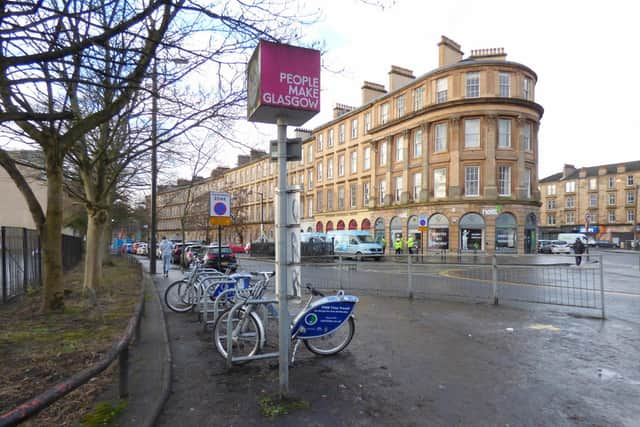Councils have key role in climate change fight - let's test their warm words on May 5 - Rachael Murphy
And as major institutions in charge of services on behalf of millions of people, they all recognise they have to do something about the environmental challenges facing our local communities.
The upcoming council elections present the perfect opportunity to turn warm words about protecting the environment into something more tangible.
Advertisement
Hide AdAdvertisement
Hide AdTo date, hard action from local government has been sporadic and inconsistent, not just in Scotland but right across the UK.


The politicians bidding to take control of these councils must lead that charge, and they can start by telling voters about their plans ahead of the May 5 vote.
Collaborative Mobility UK (CoMoUK) has spent years working with administrations of all shapes and sizes across the country on how to reduce emissions and improve lives by shaking up their approach to transport.
As the UK’s leading shared transport charity, we believe there is much that can be achieved, and quickly, in order to reduce congestion, enhance public health, and adopt measures which will improve our cities, towns and villages – and the lives of those who live there – beyond recognition.
Shared transport must be at the heart of this.


If done correctly, bike and car-sharing schemes, along with demand-responsive transport and lift-sharing, have proved they can make a stunning difference for those involved.
They enhance the mental and physical health of participants, save them money and open doors to new activities.
Shared transport schemes are already doing heavy-lifting on decarbonisation by providing alternatives to car ownership and helping to reduce greenhouse gas emissions and congestion.
READ MORE: Negative stories about cyclists are far from new – but they are good for motorists – Dr Paul Arnell
We know these initiatives directly to cleaner air and better health, with car club vehicles emitting 37 per cent less CO2 than the average UK car.
Advertisement
Hide AdAdvertisement
Hide AdOur recent bike share study also highlighted the positive impact the schemes have on people’s health, with half of Scottish bike share users saying it had contributed to them reaching the recommended two-and-a-half hours or more of physical activity per week.
But we need councils to help this along by incentivising the use of these initiatives and making them appealing to try out, especially for those who may have been previously reluctant or sceptical, or simply unconvinced about changing their daily routine.
And there are numerous easy and positive of ways to do this.
In our newly published list of 12 keys steps for local authorities we set out exactly how councils can use the powers they currently have to boost shared transport use.
We think planning rules should be tightened up so that new housing developments are given consent only when they limit parking spaces to one private car per household.
That can then be the catalyst for improving public transport in the area and increasing the options for shared transport.
We know that individuals and families who move out to these new housing estates are on the lookout for new ways of working and travelling.
A new life for many is often matched with new habits, and if these housing developments are designed with sustainability in mind, that change in behaviour will come far more easily.
Advertisement
Hide AdAdvertisement
Hide AdDevelopers have shown in the past they respond positively to planning stipulations when it comes to issues like provision of affordable housing, and there’s no reason why they won’t do the same with promoting shared transport.
We also believe there are small policy decisions councils could take to nudge people towards choosing shared transport over private vehicle ownership.
The much talked about workplace parking levy is now a power which councils can consider, and we think exempting car club vehicles from this would be a fair and positive step.
Council car parks could also earmark around five per cent of their capacity for shared vehicles.
On a bigger scale, we would urge all 32 local authorities to look at how they could establish and develop mobility hubs.
These fantastic facilities are popular across Europe, and involve various forms of sustainable and public transport coming together.
The exact form they take depends on the needs of the population they serve, but examples can include rail, bus and car club links all setting up home in one place, complemented by charging points for electric vehicles and bike-share collection and drop-off points.
A forward-thinking council will also ensure some community space is created there to make mobility hubs an attractive place for local people to come and use the shops and businesses they value.
Advertisement
Hide AdAdvertisement
Hide AdThe responsibility doesn’t need to stop at council level. The NHS could consider getting involved in these projects on the basis that a more active population will save time and resources further down the road.
People would be forgiven for thinking that between Covid, the war in Ukraine and the cost-of-living crisis that the issue of climate change has slipped down the agenda.
But the problem gets worse every day – irrespective of global events - and will continue to do so until we do something.
For our part, a quarter of Scottish emissions are caused by domestic vehicles, so we know where the action needs to be taken to make a difference.
The next generation of Scotland’s councillors will have more information, data and policy options to address this than ever before.
Whatever their political colour, it’s imperative they have the political will to deliver on this most critical of matters.
– Rachael Murphy is the Scotland director of Collaborative Mobility UK